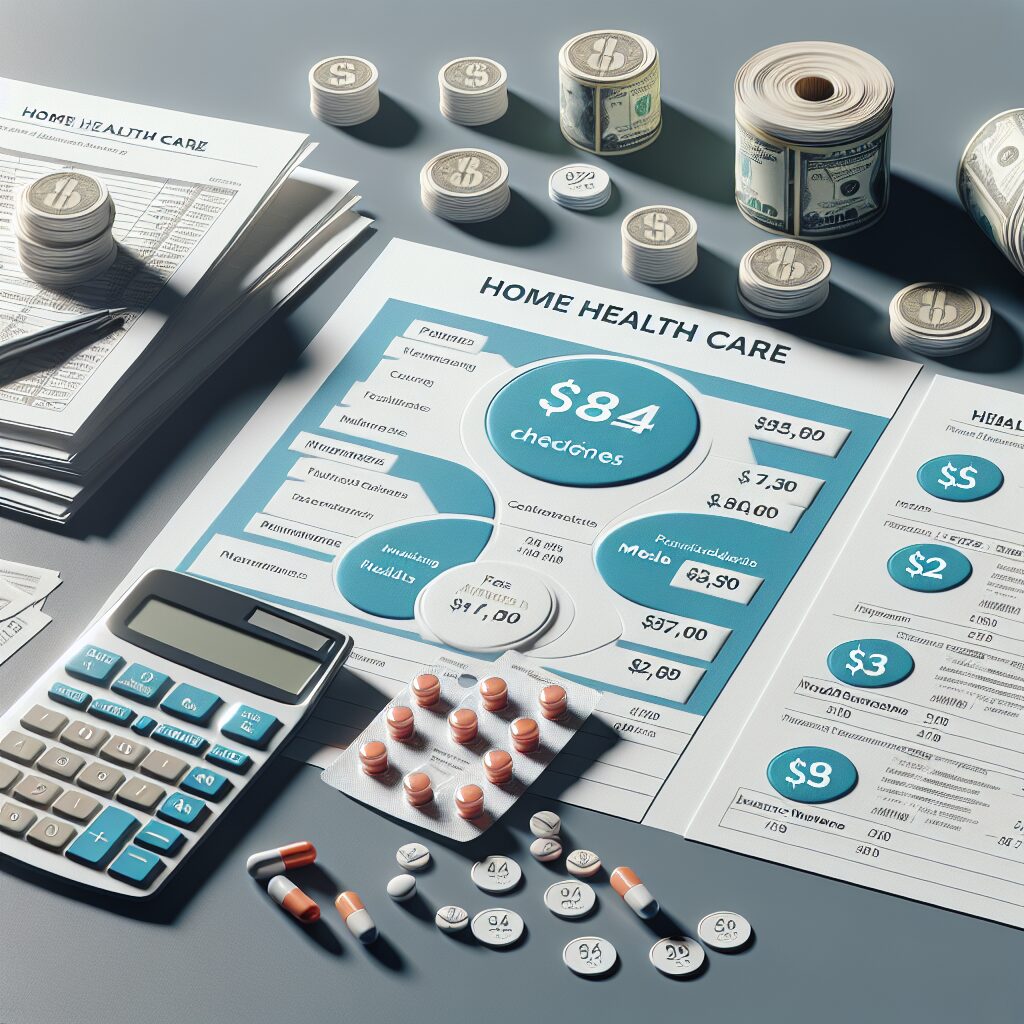Home Health Care Provider: Empowering Patients at Home
In the modern world, nursing services are beacons of hope for those requiring specialized care at home. These in-home caregivers, skilled in chronic illness management and dementia and Alzheimer’s care, offer assistance that empowers elderly individuals to maintain independence.
One-on-one attention is a reality in private-duty nursing, benefiting patients who require constant support.
Meanwhile, home health aides provide essential daily living assistance, taking care of tasks such as bathing, dressing, and meal preparation.
The advent of telehealth services is transforming the landscape of professional medical care by extending it directly into homes.
This innovative approach reduces travel requirements and offers hospice care and home infusion therapy for patients in need of ongoing treatment.
By utilizing these services, patients can effectively manage their conditions while enjoying the comfort of familiar surroundings.
Whether dealing with a chronic illness or living with dementia, elderly care providers ensure quality of life and peace of mind.
Questions about costs, insurance coverage, or hiring processes for these services? We’re here to help. Reach out today and discover how home health care can empower you or your loved one at home.
Their Role in Elderly Care
In the realm of elderly care, home health aides assume diverse roles; each one is as vital as the next. Take, for instance, wound care – they meticulously manage and dress wounds, thereby averting infection and fostering healing.
When it comes to promoting independence among seniors grappling with daily activities, home health aides step in with occupational therapy at home.
They lend a helping hand with tasks ranging from dressing to cooking, empowering them towards self-sufficiency.
Speech therapy at home is another cornerstone service for the elderly grappling with speech or swallowing problems.
Home health aides collaborate with speech therapists to help seniors articulate effectively and mitigate the risk of choking during meals.
When respiratory issues arise, home health aides take charge of administering respiratory therapy at home, ensuring proper usage of breathing equipment.
This becomes especially crucial for those afflicted with chronic obstructive pulmonary disease (COPD) or other respiratory conditions.
As seniors approach their twilight years, they might require palliative care and end-of-life care to alleviate pain and symptoms. Home health aides become beacons of dignity and peace during these trying times, offering comfort in their own homes.
Home health aides shoulder a critical responsibility in chronic disease management.
They aid seniors in managing conditions like diabetes, heart disease, or hypertension – this could entail administering medication, monitoring blood sugar levels, and working alongside healthcare professionals to fine-tune care plans.
By shedding light on the multifaceted roles of home health aides in elderly care, families can make enlightened decisions about care options for their loved ones. This knowledge serves not only to elevate the quality of life but also instills tranquility during this significant stage of existence.
In essence, home health aides serve as guardians of well-being and champions of dignity in the world of elderly care, leaving no stone unturned in their quest to ensure the best possible quality of life for those they serve.

Living with Chronic Illness: In-home Caregiver Skills
Navigating the journey of living with chronic illnesses at home can be complex, yet essential caregivers play a pivotal role in overcoming these challenges. Compassionate individuals who possess key competencies such as patient care, medication management, assistance with daily activities, and effective communication with medical professionals are crucial.
Sometimes, specialized support like home dialysis or mobile healthcare services might be necessary to provide the best possible care.
In-home medical supplies, health monitoring devices, and medical transportation are all vital resources that facilitate proper care.
When choosing a caregiver, it’s essential to consider an individual’s unique needs and preferences. A good match between caregiver and client, taking shared interests and personality traits into account, can significantly enhance overall well-being.
Self-empowerment in managing chronic illnesses involves researching available resources, preparing questions for potential caregivers, and creating a comprehensive care plan with healthcare providers and caregivers. Telehealth services and senior living solutions offer innovative ways to monitor health and receive virtual consultations.
Skilled in-home caregivers are integral to the well-being of those living with chronic illnesses.
Seek out the right support, advocate for your needs, and take an active role in managing your care.
- Specialized support like home dialysis and mobile healthcare services can be necessary for providing optimal care.
- In-home medical supplies, health monitoring devices, and medical transportation are essential resources for proper care.
- A good match between caregiver and client, considering shared interests and personality traits, can significantly enhance overall well-being.
- Self-empowerment in managing chronic illnesses includes researching available resources, preparing questions for potential caregivers, and creating a comprehensive care plan with healthcare providers and caregivers.
Managing Dementia & Alzheimers at Home: Expert Advice
Navigating the complexities of dementia and Alzheimer’s care at home calls for thoughtful strategies and professional assistance. Early recognition of symptoms is vital, leading to effective coordination of care.
Establishing routines and adapting environments are essential elements in daily living, often requiring the expertise of geriatric care services.
Communication is key in managing these conditions at home.
Simplified language and positive interactions, facilitated by companion care providers, can help reduce frustration for both patient and caregiver.
Balanced nutrition and regular exercise are crucial for overall well-being.
Home care providers can assist with meal preparation and exercise routines to ensure these needs are met.
Medication management in a home setting can be demanding.
Patient advocacy services help maintain safety by organizing, administering, and monitoring medications effectively.
When caring for someone with dementia or Alzheimer’s at home, respite care services offer temporary relief for caregivers, while telehealth services provide ongoing support remotely.
Self-care is essential for caregivers to avoid burnout. Taking breaks, seeking support from other family members, or professional services are crucial for maintaining personal well-being.
A comprehensive approach to home dementia and Alzheimer’s care encompasses nonmedical care, geriatric care, eldercare services, companion care, respite care, patient advocacy, care coordination, and home care providers.
By following these strategies, you can provide your loved one with the best possible care while safeguarding your own well-being. These services include nonmedical care, geriatric care, elder care, companion care, respite care, patient advocacy, care coordination, and home care providers, ensuring comprehensive support for patients in their homes.
How can a Home Health Care Provider Empower Patients at Home Compared to a Nursing Home?
A home health care provider can empower patients at home in ways that a nursing home cannot. The personalized care and attention provided by a home health care provider can help patients maintain their independence and emotional well-being. In addition, being in a familiar environment can significantly benefit their overall health and comfort, setting it apart from the nursing home experience.
Wound Care and Physical Therapy: Your At-Home Guide
Transform your living space into a healing sanctuary with this comprehensive guide on wound care and physical therapy.
Essential items such as mobility aids for home become crucial for easy accessibility during recovery.
Proper wound care at home involves techniques like cleaning, dressing, and monitoring your wounds effectively. Always consult with your healthcare provider for personalized instructions.
Physical therapy exercises can help alleviate discomfort and promote healing.
These customized regimes may include stretching, strengthening, and balance exercises.
Telehealth services have made it easier to receive medical advice from the comfort of your home through video consultations.
In-home support can provide an essential helping hand during recovery for seniors.
This may involve hiring a private duty nurse or working with a home health agency.
Medical house calls from healthcare professionals may be possible, ensuring continuity of care in your own environment.
Innovative technologies can also aid in wound care management.
For example, mobile apps and devices are designed to monitor wounds and remind users when it’s time for dressing changes.
Assisted living at home may be an option for those facing the end-of-life stage, providing comfort and care within the familiarity of home. Home hospice services are available in such cases.
Home hospice provides comforting medical house calls and essential mobility aids for seniors in assisted living at home, ensuring quality healthcare even during telehealth consultations and in-home support.
| Essential Items | Additional Home Care Items |
|---|---|
| Mobility aids for home | Private duty nurse or home health agency services |
| Wound monitoring mobile apps and devices | In-home support technology (e. g. , telehealth services, medical house calls) |
| Assisted living at-home options for seniors | Home hospice services during the end-of-life stage |



